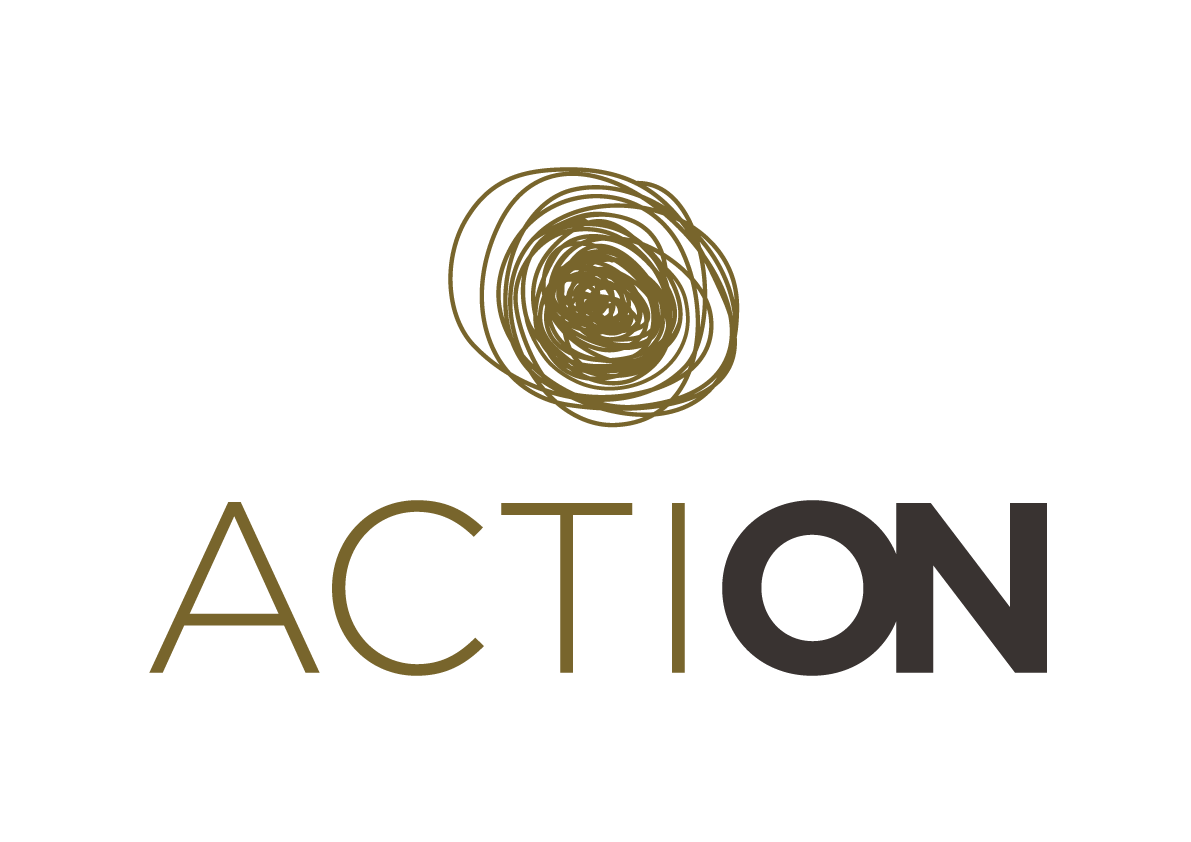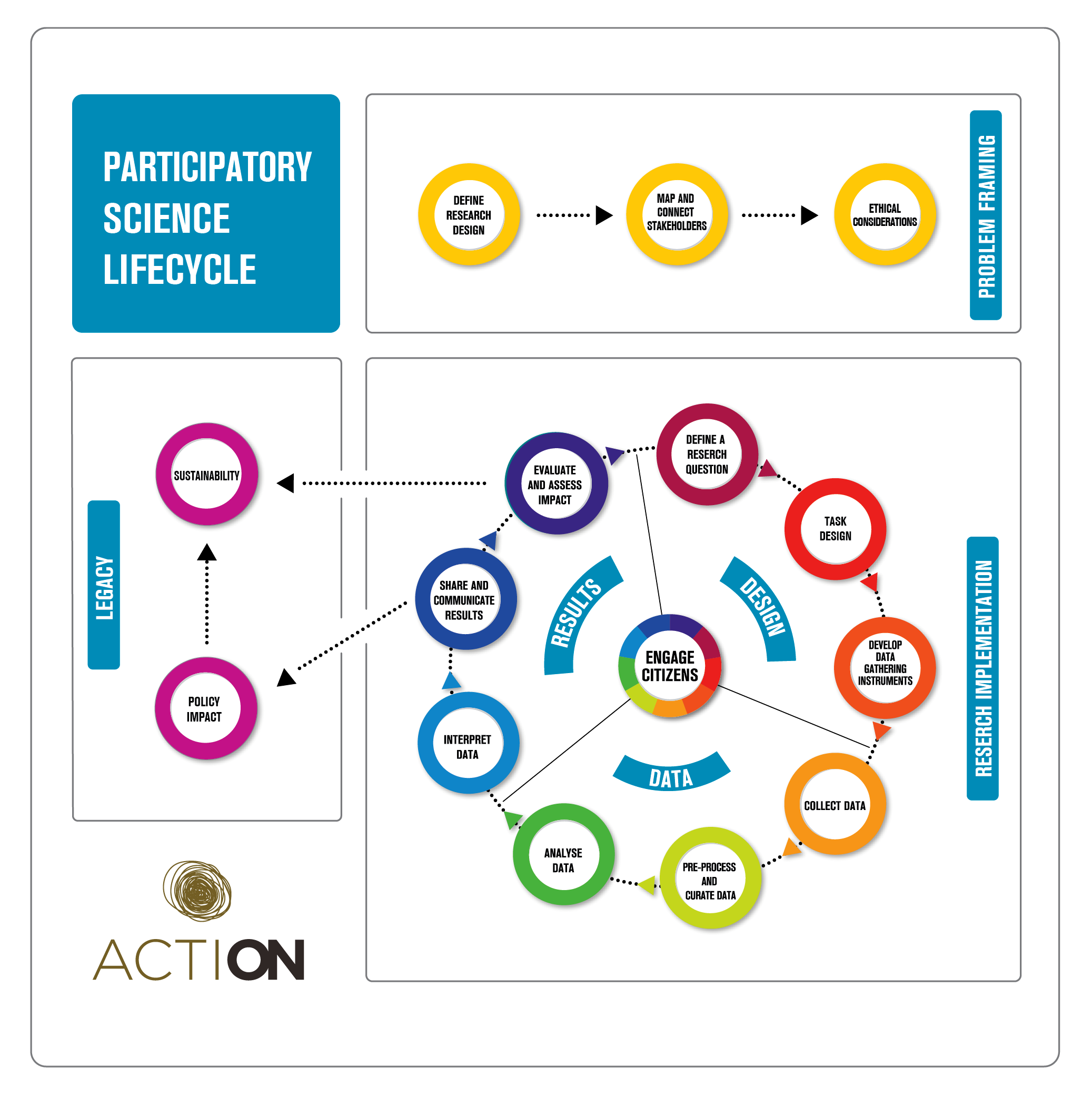Participatory science toolkit
against pollution
Let us know what you think
about the ACTION toolkit!
Citizen science project checklist - the ACTION toolkit in a nutshell
This checklist, compiled by the ACTION consortium, is meant to give you a quick overview of all the aspects that need to be considered for a successful citizen science project.
- Aims
- What do you hope to achieve by doing this project?
- Scientific framing
- What is your research question?
- How can it be answered through citizen science?
- Have you identified any research hypotheses that you want to validate?
- Are you able to run a control experiment?
- Timeline
- Over what time period do you want to carry out your project?
- What are the concrete milestones you need to achieve, and in which timeframe?
- Is there an endpoint/goal, or is it open ended?
- Stakeholders
- Who is affected by and interested in the project and its outcomes?
- Who would be willing to participate?
- Roles
- Who is doing what in the project?
- Are they part of the core team?
- Are they paid or engaging voluntarily, and what does this entail?
- Are there multiple ways to engage with your project depending on capacity?
- Resources
- What resources do you need to implement your project, and how will you acquire them?
- What results or main tools of the project need to remain available after the end of the project, and to whom?
- What resources are needed to keep these available after the end of the project?
- Reality check
- Are your expectations for your project and your citizen scientists realistic?
- Ethics
- Have you considered the risks your project might pose, and how you mitigate them?
- What steps have you taken to prevent your project causing harm to your participants and environment?
- How do you account for the needs, sensitivities and expectations of the stakeholders you are planning to engage?
- Data
- What data do you need to collect to answer your research question?
- Who will collect and analyse the data, and how?
- Are you collecting sensitive data (locations, names etc.), and how do you process it safely if you do?
- Where and how will you store your data?
- How can you ensure quality in your dataset?
- Where are you going to publish your data?
- What kind of licence are you going to use?
- Do you have consent from your citizen science cohort?
- Communication strategy
- Have you planned your capacity for communication and dissemination?
- What will your citizen scientists and the interested public want to find out about your project?
- Do you have a central point of information that you can link to?
- Community engagement
- Who is in charge?
- Who should be part of your project community?
- What methods will you use to reach out to and build the community?
- What are you doing to make your project open and welcoming for different kinds of social groups?
- Sustainability
- Do you need to make the project work long term?
- How can you make sure there are enough resources to do so?
- Impact
- How will you move your project from answering your research questions to effecting change?
- How will you identify and maximise your scientific, social, economic, political and environmental impacts?
- Which policy makers would be interested in the results of your project and how do you reach out to them?
What is citizen science?
Citizen science is “general public engagement in scientific research activities when citizens actively contribute to science either with their intellectual effort or surrounding knowledge or with their tools and resources” (European Commission, 2014). The term covers a range of activities with different levels of participation, from data collection in projects led by trained scientists to co-designing research questions and policy to science literacy and public engagement. To truly be citizen science, however, it is important that there is a scientific question and methodology, and that the activities are carried out by participating citizens. It is this citizen engagement that is inherent to the CS project and their goals.
Citizen science projects differ in many ways, such as their goals, how they organise, the technology they use, or the way they engage with citizens and other stakeholders (Schrögel & Kolleck, 2019). Throughout this toolkit, wherever possible we give diverse recommendations based on different types of projects that were represented within ACTION.
About ACTION
ACTION (Participatory science toolkit against pollution) was a three year programme dedicated to transforming the way citizen science (CS) is conducted today: from a mostly scientist-led process to a more participatory, inclusive, citizen-led one, which acknowledges the diversity of the CS landscape and of the challenges CS teams have to meet as their projects evolve.
ACTION applied a citizen science approach to tackling environmental pollution, one of the greatest threats to human health and wellbeing of our times, killing more people than smoking, hunger, natural disasters, war and infectious diseases such as HIV/AIDS and coronavirus. The research ACTION conducted accounted for the multitude of variations in CS, addressing everything from small-scale, localised social issues to international research agendas. ACTION learned about the needs of different stakeholders throughout the lifecycle of CS, and created methodologies, tools and guidelines to democratise the scientific process, allowing anyone to design and realise a CS project from the early stages of ideation to validating and publishing the results. All of ACTION’s outputs are openly available. The digital infrastructure ACTION provided helps citizen scientists to use existing specialised platforms and publish results according to responsible research and innovation principles.
ACTION worked with a cohort of 16 on-the-ground citizen science pilots tackling major forms of pollution. Some pilots were selected through an open call mechanism, allowing them to receive funding and support they might otherwise be unable to access. All pilots were part of the ACTION accelerator, which provided the support and guidance that the projects needed to grow and become more sustainable. The pilots in turn helped ACTION to understand different aspects of CS, co-create resources, and also act as case studies throughout this toolkit, illustrating different practices and challenges in the participatory science lifecycle. A complete list of the pilots is provided at the end of this document.
The ACTION toolkit
The ACTION toolkit is the ultimate resource collection for everyone interested in doing citizen science the ACTION way. The toolkit draws on expertise in citizen science, participatory design, social innovation, socio-economic studies, pollution, open science, social computing, open data and software development in the ACTION team, to ensure it suits the requirements of citizen science projects, addressing the practical problems that they face throughout the different stages of each project.
Figure 1: The Participatory Science Lifecycle
The toolkit is meant for pollution-focused citizen science projects of all kinds, and everyone who wishes to apply citizen science methods. While some of the aspects we discuss may be less relevant for non-pollution focused projects, such projects may still benefit from the insights and resources provided. The toolkit can be used by citizen volunteers, local communities interested in starting a citizen science project, researchers wishing to engage with citizens in their work, or public authorities interacting with citizens or working on policies where citizen science insights are relevant. We hope it will help them to plan, create, improve, and maximise the impact of their projects.
The toolkit follows the participatory science lifecycle. The lifecycle helps to orient your project through three stages: problem framing, research implementation, and legacy, which each include a number of steps that projects can take. The framework aims to provide guidance on what a CS project could do, and a potential order of things; it helps to break down the steps, and provides a structure that is broadly applicable to all participatory science endeavours. Both the stages and the individual steps will look different for each project, and the persons and groups involved in each of the phases may differ.
While the layout of the lifecycle may suggest a neat sequence, in practice projects will find that there are feedback loops and iterations, and that some steps will have to be taken multiple times, while others can be skipped altogether. Looking at the lifecycle as a tool in its own right will help projects understand what they have to do and consider in future, supporting their awareness and planning in earlier stages.
The objective of the first stage, problem framing, is to define the basic project design, engage relevant stakeholders, and consider the ethics of the planned project. In this phase, the whole project lifecycle should be considered to set appropriate goals for the project and consider details such as the impact it aims to achieve and how it is to be maintained and financed.
In the second stage, research implementation, the citizen science project is implemented. This encompasses three phases:
During the design phase, projects define their methodology, create tasks for participants, and select or develop appropriate data gathering instruments.
In the data phase, projects acquire, curate, process, and analyse their data.
In the results phase, projects summarise, publish and disseminate their findings for different stakeholder groups, and assess their impact on both the issues they are trying to address, and society, including their own participants.
Citizen engagement, while often focused in the research implementation phase, should ideally happen throughout the entire project lifecycle.
In the third stage, Legacy, projects find and use routes for policy agenda setting, help formulate policies, influence decision-making and the implementation of policies. They also work towards sustainability of their community and finances.
The toolkit offers an introductory overview and guidance, a selection of tools, guidelines and recommendations, and case studies for each phase and stage, to help CS projects understand and replicate best practice.
Users of the toolkit should consider which of the CS project types they are closest to, noting that it may be multiple. The typology will help them to position their project in the context of the resources and case studies we discuss. We will come back to them as we move through the participatory life cycle.
The toolkit cannot and does not want to be exhaustive. It is based on the collective experience and expertise in the ACTION accelerator, as well as the wider citizen science community. It includes tools and resources developed by ACTION and others that we have found useful in practice. We will keep adding to it beyond the lifetime of the ACTION project. You can send suggestions to info@actionproject.eu.

